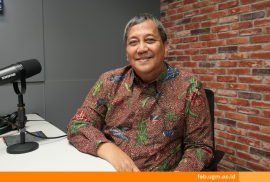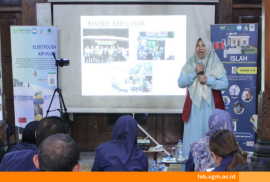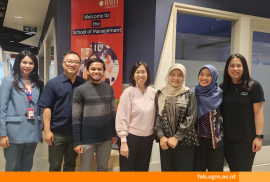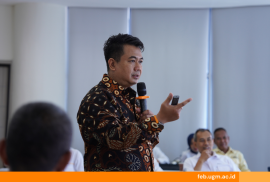Economics and Business Research and Training (P2EB) Faculty of Economics and Business Universitas Gadjah Mada (FEB UGM) and the Economic Research Institute for ASEAN and East Asia (ERIA) as Co-hosts held the Parallel Session T20 Indonesia Summit 2022 with the topic “Promoting Sustainable Investment and Financing (SIF) as A New Approach for Infrastructure Development” on Tuesday (06/09). Think20 (T20) is the official G20 engagement group bringing together leading think tanks and research centers worldwide. The event was held offline in Bali and was also live broadcasted.
Acting as Chair who led the discussion was Fauziah Zen, Co-Chair of Task Force 8 T20 Indonesia. At the beginning of the event, there was a keynote speech delivered by Bambang Susantono as Head of the Archipelago Capital Authority. Meanwhile, for the panel discussion session which is the core of the event, a number of prominent speakers were presented, namely Stefanus Hadiwijaja as Co-Chair of the B20 Infrastructure Financing Working Group CEO, Sinthya Roesly as Director of Finance and Risk Management, PT PLN (Persero), and Nicolas Buchoud as Co-Chair of Task Force 8 T20 Indonesia.
The topics raised in this panel discussion session brought up cross-sectoral issues which at least included issues of SDGs, climate change, infrastructure development, project risking, and blended finance. The objective of this session is to update us with the latest progress in sustainable finance, discuss the examples, challenges, and opportunities that are expected to eventually turn into proposals for recommendations to G20 dealers.
Sustainable infrastructure includes built-in or naturally occurring systems that provide a range of services that ensure economic, financial, social, environmental, and institutional sustainability. Meanwhile, sustainable finance is the process of taking into account environmental, social and governance (ESG) considerations when making investment decisions in the financial sector, leading to more long-term investments in sustainable economic activities and projects.
Based on the ongoing panel discussion, infrastructure is truly a fundamental driver of strong and sustainable economic growth. Some of the largest countries in the world have been successful in driving growth for a long period through infrastructure development. However, globally we know that there is a huge gap in infrastructure financing. Recognizing this huge gap, we need to think about how to accelerate the development of a just transition as a recommendation to G20 leaders.
Regarding Indonesia’s financing scheme for sustainable infrastructure and the energy transition, according to Sinthya Roesly, it is one of the key topics that need to be resolved by everyone on the global platform as well as the regional platform. We need to make an energy transition and be responsible for preparing brown projects to be green projects to be absorbed by the market. Indonesia is currently set up for an energy transition and there are challenges as it needs a common understanding of how to do it and how the impact of the energy transition can be absorbed by the government from the fiscal budget.
Meanwhile, regarding global investment platforms for development projects, according to Nicolas Buchoud, when we expand our understanding from only infrastructure investment to possible spillover effects, it is seen that there is rarely a significant structured place to think about what is the potential output in terms of well-being and other factors. Therefore, think tanks are needed and it’s a good reason to launch initiatives such as a global investment platform for sustainable infrastructure. The event then ended with a closing remarks delivered by Prof. Danang Parikesit as Lead Co-Chair of Task Force 8 T20 Indonesia.
Reportage: Kirana Lalita Pristy




